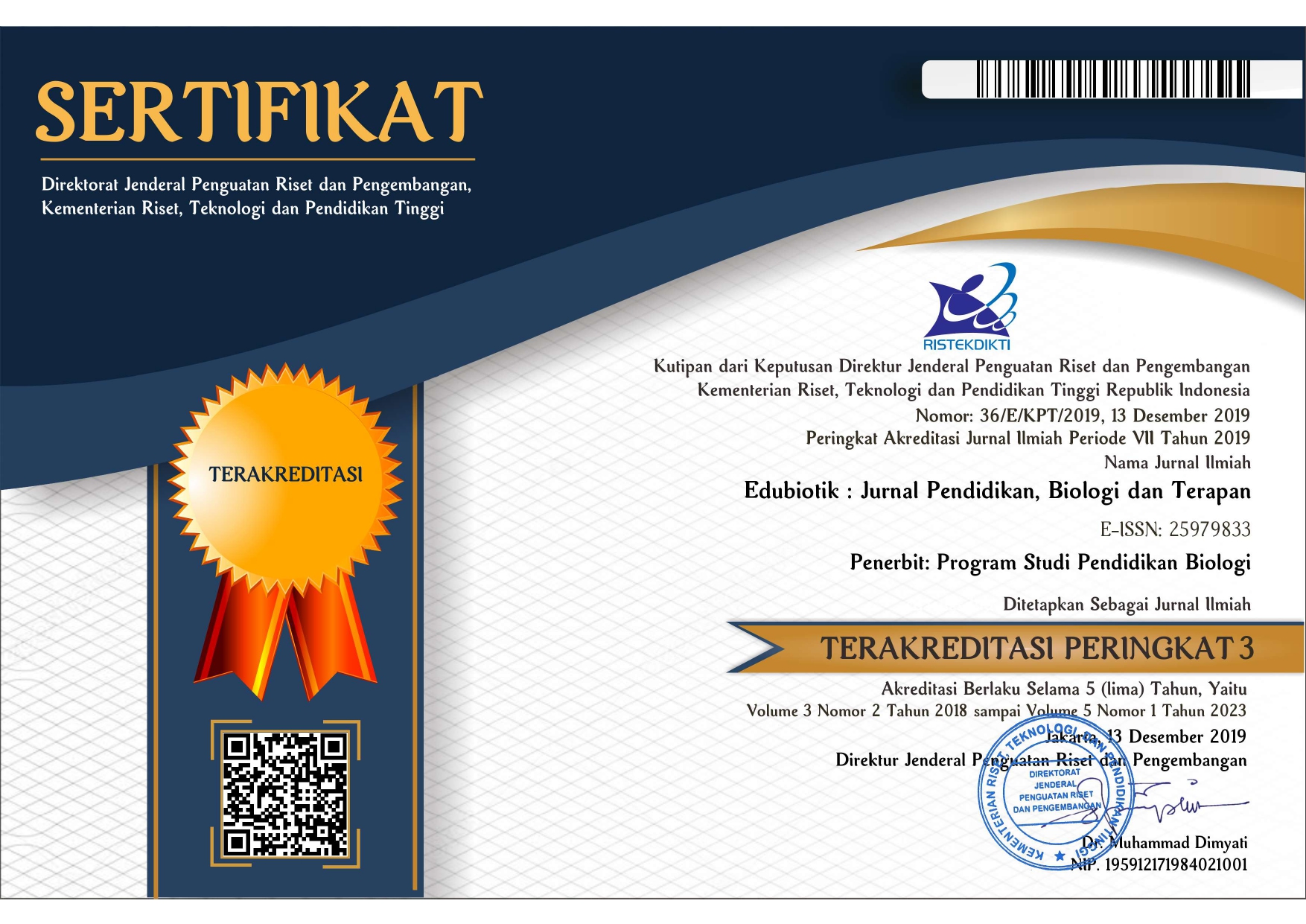ILMIZI model in environmental learning during COVID-19: Improving students’ attitudes in University
Abstract
Environmental education amid Coronavirus Disease 2019 (COVID-19) pandemic requires innovation. The pandemic situation need to improving student attitudes in maintaining the environment need an improvement by conducting various innovations and one of them is ILMIZI learning model utilization. The research aim was to improve student attitudes with the ILMIZI model. The research method is experimental without a control class. Samples involved in the research consist of 61 students with a treatment of environmental learning using the ILMIZI model. The Instrument used in this research was the attitude instrument with a scale of 1-5. The research results suggest that t-value (.231) > t-statistic (1.67) indicating that the ILMIZI model is not yet effective in improving the students’ attitudes in maintaining the environment. The pretest score (83.80) and post-test score (83.62) are not significantly different. The conclusion drawn from the research is that the ILMIZI model has not effective in improving student attitudes in maintaining the environment during COVID-19.
References
Bandyopadhyay, S. (2020). Coronavirus Disease 2019 (COVID-19): We Shall Overcome. Clean Technologies and Environmental Policy. https://doi.org/10.1007/s10098-020-01843-w
Bustami, Y., Syafruddin, D., & Afriani, R. (2018). The Implementation of Contextual Learning to Enhance Biology Students’ Critical Thinking Skills. Jurnal Pendidikan IPA Indonesia, 7(4), 451–457. https://doi.org/10.15294/jpii.v7i4.11721
Carrillo, C., & Flores, M. A. (2020). COVID-19 and Teacher Education: A Literature Review of Online Teaching and Learning Practices. European Journal of Teacher Education, 43(4), 466–487. https://doi.org/10.1080/02619768.2020.1821184
Cutri, R. M., Mena, J., & Whiting, E. F. (2020). Faculty Readiness for Online Crisis Teaching: Transitioning to Online Teaching during The COVID-19 Pandemic. European Journal of Teacher Education, 43(4), 523–541. https://doi.org/10.1080/02619768.2020.1815702
Djamahar, R., Ristanto, R. H., Sartono, N., Ichsan, I. Z., & Muhlisin, A. (2018). CIRSA : Designing Instructional Kits to Empower 21 st Century Skill. Educational Process: International Journal, 7(3), 200–208. https://doi.org/10.22521/edupij.2018.73.4
Esa, N. (2010). Environmental Knowledge, Attitude and Practices of Student Teachers. International Research in Geographical and Environmental Education, 19(1), 39–50. https://doi.org/10.1080/10382040903545534
Evans, G. W., Otto, S., & Kaiser, F. G. (2018). Childhood Origins of Young Adult Environmental Behavior. Psychological Science, 29(5), 679–687. https://doi.org/10.1177/0956797617741894
Flores, M. A., & Swennen, A. (2020). The COVID-19 Pandemic and Its Effects on Teacher Education. European Journal of Teacher Education, 43(4), 453–456. https://doi.org/10.1080/02619768.2020.1824253
Gündüz, A. Y., Alemdağ, E., Yaşar, S., & Erdem, M. (2016). Design of A Problem-Based Online Learning Environment and Evaluation of Its Effectiveness. The Turkish Online Journal of Educational Technology, 15(3), 49–57. https://doi.org/10.1017/CBO9781107415324.004
Husamah, H., Fatmawati, D., & Setyawan, D. (2018). OIDDE Learning Model: Improving Higher Order Thinking Skills of Biology Teacher Candidates. International Journal of Instruction, 11(2), 249–264. https://doi.org/10.12973/iji.2018.11217a
Ichsan, I. Z. (2019). ILMIZI: Innovation Learning Model for Natural Science and Environmental Learning Based on HOTS. International Journal for Educational and Vocational Studies, 1(6), 578–584. https://doi.org/10.29103/ijevs.v1i6.1640
Ignell, C., Davies, P., & Lundholm, C. (2019). A Longitudinal Study of Upper Secondary School Students’ Values and Beliefs Regarding Policy Responses to Climate Change. Environmental Education Research, 25(5), 615–632. https://doi.org/10.1080/13504622.2018.1523369
Jiang, B., Yang, J., Lv, Z., Tian, K., Meng, Q., & Yan, Y. (2017). Internet Cross-Media Retrieval Based on Deep Learning. Journal of Visual Communication and Image Representation, 48, 356–366. https://doi.org/10.1016/j.jvcir.2017.02.011
Kartikaningtyas, V., Kusmayadi, T. A., & Riyadi, R. (2018). The Effect of Brain Based Learning with Contextual Approach Viewed from Adversity Quotient. Journal of Physics: Conference Series, 1022. https://doi.org/10.1088/1742-6596/1022/1/012014
Keles, O. (2017). Investigation of Pre-Service Science Teachers’ Attitudes towards Sustainable Environmental Education. Higher Education Studies, 7(3), 171. https://doi.org/10.5539/hes.v7n3p171
Kew, S. N., Petsangsri, S., Ratanaolarn, T., & Tasir, Z. (2018). Examining The Motivation Level of Students in E-Learning in Higher Education Institution in Thailand: A case study. Education and Information Technologies, 23(6), 2947–2967. https://doi.org/10.1007/s10639-018-9753-z
Kidd, W., & Murray, J. (2020). The Covid-19 Pandemic and Its Effects on Teacher Education in England: How Teacher Educators Moved Practicum Learning Online. European Journal of Teacher Education, 43(4), 542–558. https://doi.org/10.1080/02619768.2020.1820480
Kleebbua, C., & Siriparp, T. (2016). Effects of Education and Attitude on Essential Learning Outcomes. Procedia-Social and Behavioral Sciences, 217, 941–949. https://doi.org/10.1016/j.sbspro.2016.02.061
Konig, J., Jager-Biela, D. J., & Glutsch, N. (2020). Adapting to Online Teaching During COVID-19 School Closure: Teacher Education and Teacher Competence Effects Among Early Career Teachers in Germany. European Journal of Teacher Education, 43(4), 608–622. https://doi.org/10.1080/02619768.2020.1809650
Lau, K. (2017). ‘The Most Important Thing is to Learn The Way To Learn’: Evaluating The Effectiveness of Independent Learning by Perceptual Changes. Assessment and Evaluation in Higher Education, 42(3), 415–430. https://doi.org/10.1080/02602938.2015.1118434
Lee, S. M. (2014). The Relationships between Higher Order Thinking Skills, Cognitive Density, and Social Presence in Online Learning. Internet and Higher Education, 21, 41–52. https://doi.org/10.1016/j.iheduc.2013.12.002
Markaki, V. (2014). Environmental Education through Inquiry and Technology. Science Education International, 25(1), 86–92. Retrieved from https://files.eric.ed.gov/fulltext/EJ1022987.pdf
Ören, F. Ş., & Meriç, G. (2014). Seventh Grade Students’ Perceptions of Using Concept Cartoons in Science and Technology Course To cite this article : Seventh Grade Students ’ Perceptions of Using Concept Cartoons in Science and Technology Course. International Journal of Education in Mathematics, Science and Technology, 2(2), 116–136. Retrieved from https://files.eric.ed.gov/fulltext/EJ1066361.pdf
Paristiowati, M., Hadinugrahaningsih, T., Purwanto, A., & Karyadi, P. A. (2019). Analysis of Students’ Scientific Literacy in Contextual-Flipped Classroom Learning on Acid-Base Topic. Journal of Physics: Conference Series, 1156(1), 012026. https://doi.org/10.1088/1742-6596/1156/1/012026
Parkin, H. J., Hepplestone, S., Holden, G., Irwin, B., & Thorpe, L. (2012). A Role for Technology in Enhancing Students’ Engagement with Feedback. Assessment and Evaluation in Higher Education, 37(8), 963–973. https://doi.org/10.1080/02602938.2011.592934
Rahmayanti, H., Ichsan, I. Z., Azwar, S. A., Purwandari, D. A., Pertiwi, N., Singh, C. K. S., & Gomes, P. W. P. (2020). DIFMOL: Indonesian Students’ HOTS and Environmental Education Model during COVID-19. Journal of Sustainability Science and Management, 15(7), 10–19. https://doi.org/10.46754/jssm.2020.10.002
Reyna, J., Hanham, J., & Meier, P. (2018). The Internet Explosion, Digital Media Principles and Implications to Communicate Effectively in The Digital Space. E-Learning and Digital Media, 15(1), 36–52. https://doi.org/10.1177/2042753018754361
Sigit, D. V., Miarsyah, M., Komala, R., Suryanda, A., Ichsan, I. Z., & Fadrikal, R. (2020). EECN: Analysis, Potency, Benefit for Students Knowledge and Attitude to Conserve Mangroves and Coral Reefs. International Journal of Instruction, 13(1), 125–138. https://doi.org/10.29333/iji.2020.1318a
Talmi, I., Hazzan, O., & Katz, R. (2018). Intrinsic Motivation and 21st-Century Skills in An Undergraduate Engineering Project: The Formula Student Project. Higher Education Studies, 8(4), 46. https://doi.org/10.5539/hes.v8n4p46
Um, T., & Chung, N. (2019). Does Smart Tourism Technology Matter? Lessons from Three Smart Tourism Cities in South Korea. Asia Pacific Journal of Tourism Research, 1–19. https://doi.org/10.1080/10941665.2019.1595691
Yusop, F. D., & Sumari, M. (2013). The Use of Social Media Technologies among Malaysian Youth. Procedia-Social and Behavioral Sciences, 103, 1204–1209. https://doi.org/10.1016/j.sbspro.2013.10.448





.png)
2.png)

1.jpg)


